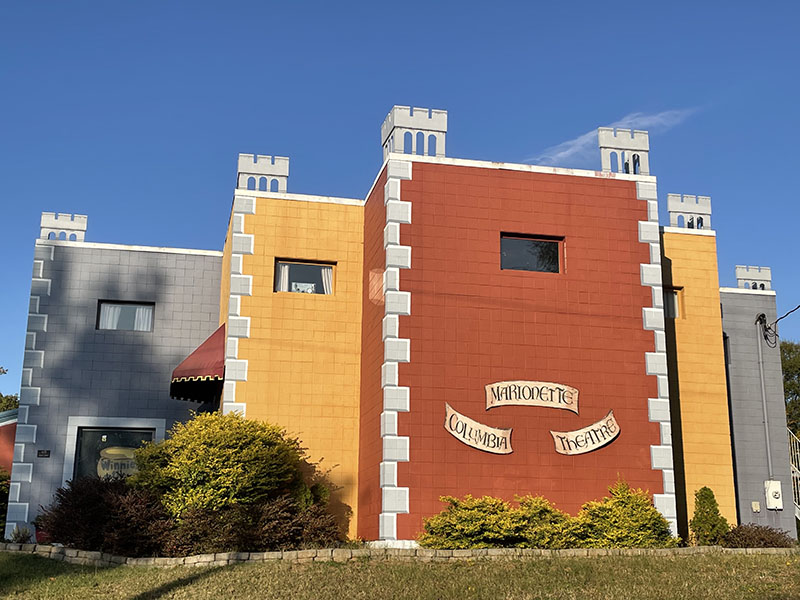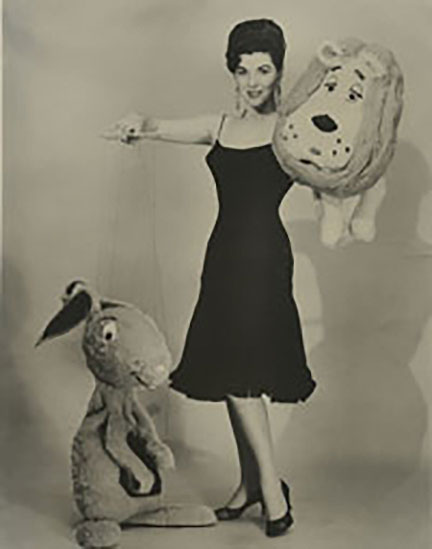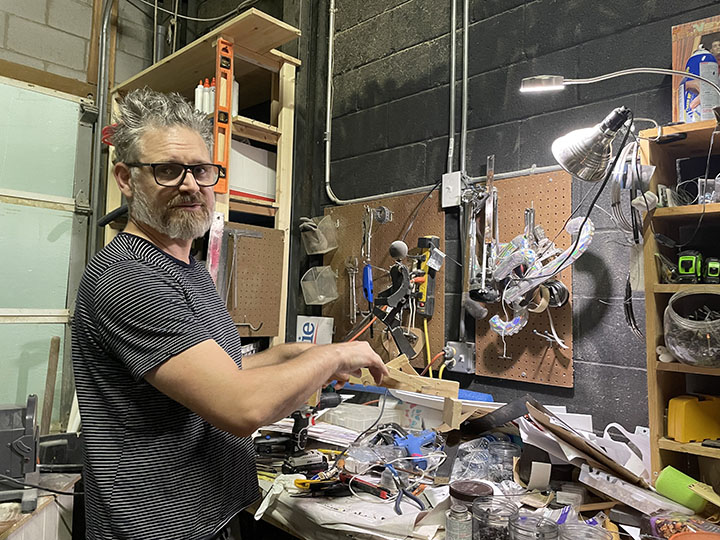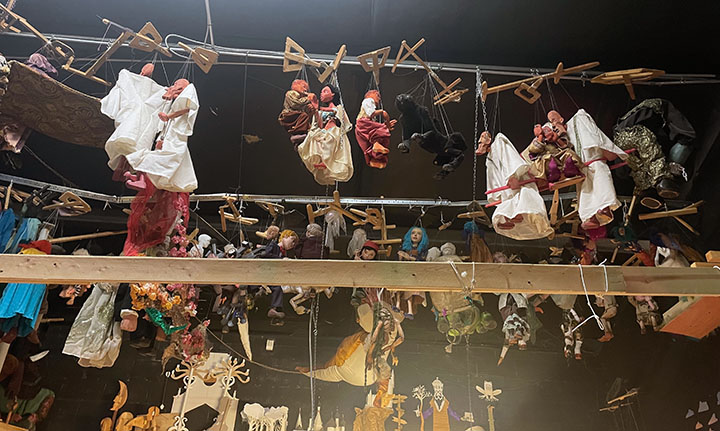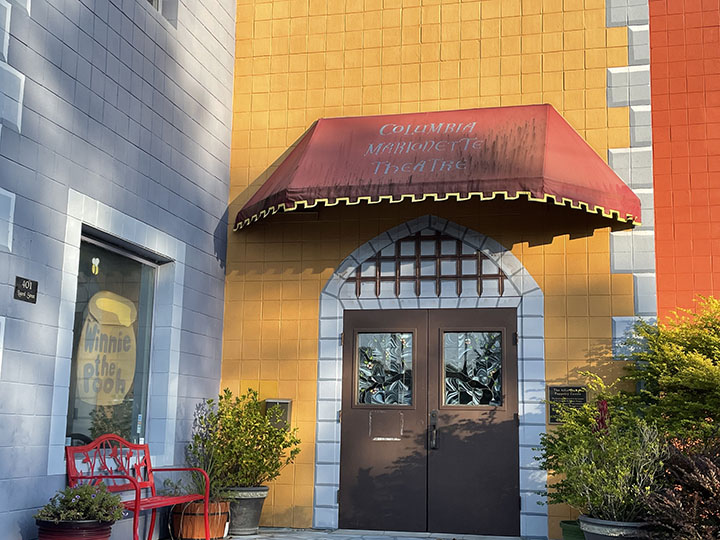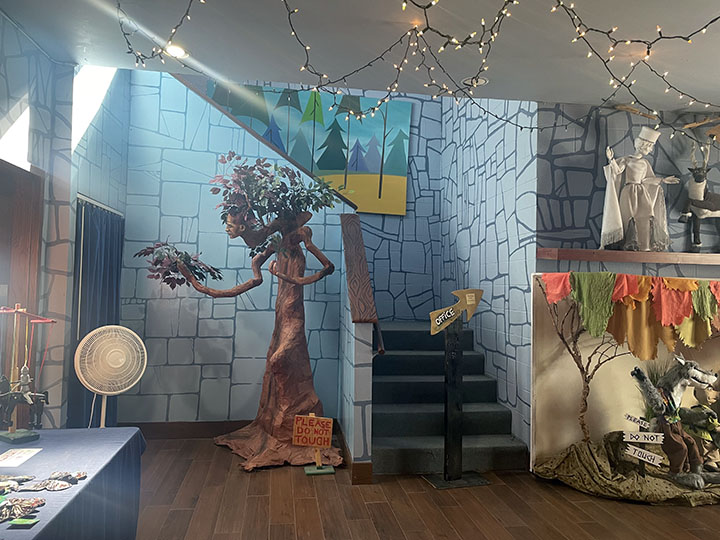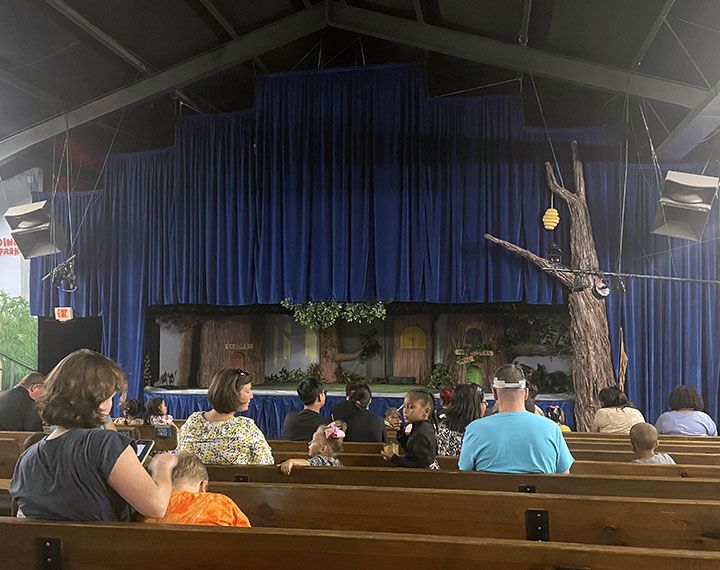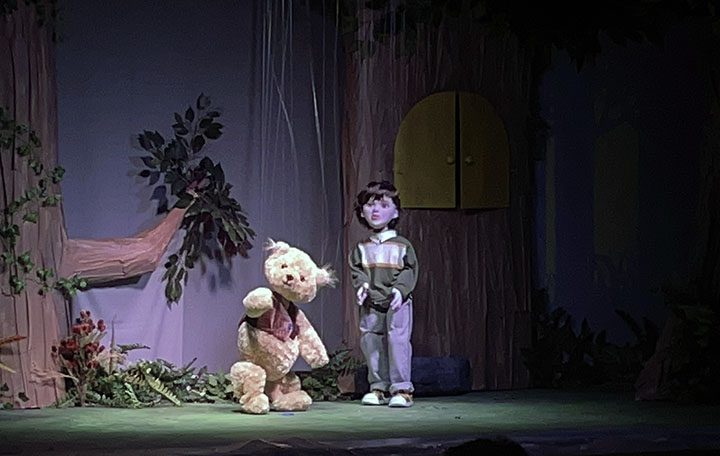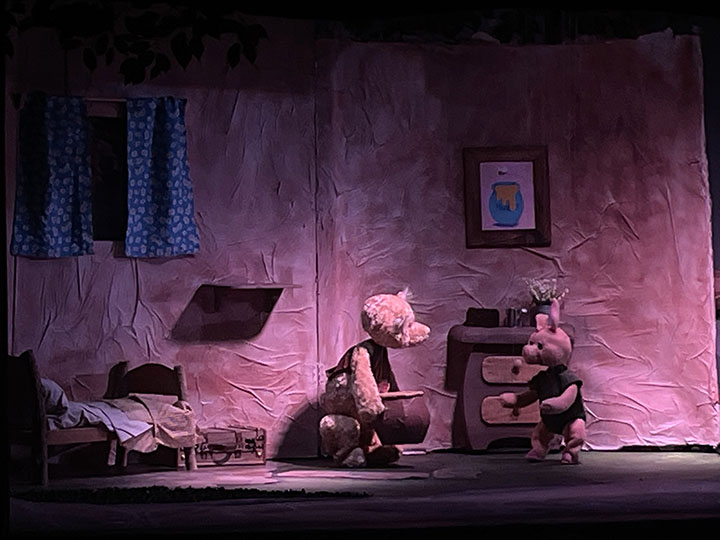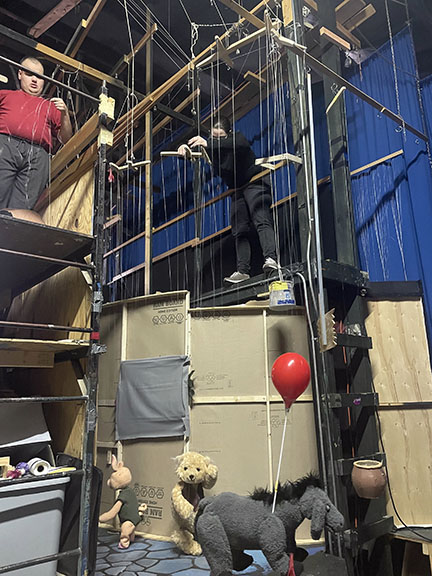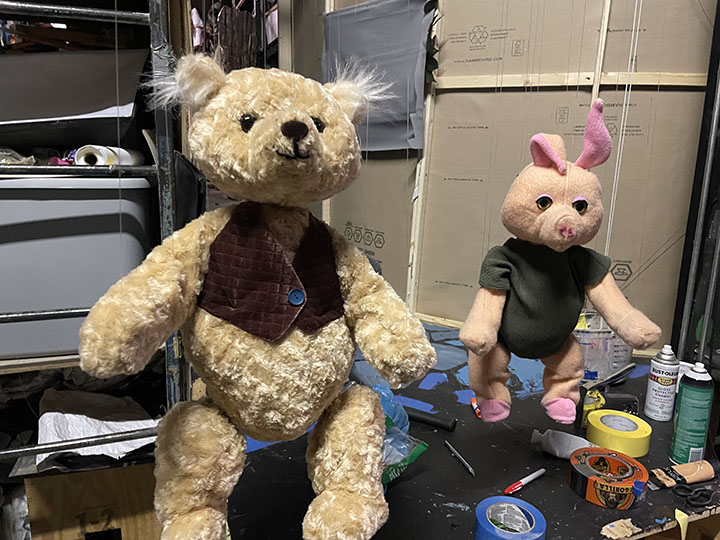The colorful building at 401 Laurel St. near Riverfront Park was built specifically to be a puppet theatre by founder Allie Scollon in 1995, though the organization started in 1988. (Photo by Jade Crooks)
Before John Scollon took over his mom’s puppet theater, he wanted to be a rock star.
His mom, Allie Scollon, had different plans for him.
She had been a puppeteer all her life. She spent her childhood playing with dolls tied to strings. When malls began to pop up across America in the 1950s she performed puppet shows for shoppers. She even auditioned against Jim Henson to land the television show that became “The Muppet Show” — he won that gig.
In the late 1960s, she left puppetry to start a mascot costume factory with her husband in Chapin. But by the mid-80s, she “got the itch” to get back to her puppets. So she turned to her son, who agreed to help her — at least until he became a rock star.
The two started the Columbia Marionette Theatre in 1988 with “very little, if anything,” John Scollon said, and moved to the unique Laurel Street building in 1995. But 33 years after its founding, it’s a staple for families and elementary schools across South Carolina. John Scollon still has a band, but puppets stole his show.
He is now executive director of the theater — his mother retired 20 years ago — and he attributes its success to good fortune and good shows. Most parents know about the 200-seat-theater through word of mouth or because they grew up with it.
“If you put on a good show, and somebody likes it, they’ll tell two people and they’ll tell two people and they’ll tell two people, and eventually you grow an audience,” John Scollon said.
On a recent Monday, elementary school students and their families joined others in the crowd to see “Winnie the Pooh,” the theater’s latest offering. Mondays are special because the children get to play with the puppets after the show. Eden Slicker came from Salley, S.C., with her two children during Fall break. Slicker’s kids’ grandmother, suggested they go.
“Their grandma does a lot in Columbia, so she’s always trying to find stuff for the grandkids to do,” Slicker said. “Where we stay, there’s not much to do, and I think it’s great there’s a place like this not too far from us.”
Not many people can say a marionette theater is “not too far” from them. There are only two in the Southeast — this one, and the Center for Puppetry Arts in Atlanta.
“We’re the only puppet show that most people are going to see who live around here, but that doesn’t mean that we can get away with substandard work,” said Lyon Hill, the theater’s artistic director.
The theater primarily puts on four family-oriented shows a year, typically classic children’s stories such as “Winnie the Pooh” or “The Three Little Pigs.”
Hill said he includes a few jokes for the adults in the shows. But he has tamped down his cynicism a bit since having kids of his own.
“Even though I thought I was writing for children, I was probably writing a little bit more for like a ‘tween because I wanted things to be ‘cool’ and little edgy,” Hill said. “Once I had my babies, I just realized sometimes we need to make something that is untainted by the cynicism of the world.”
He said showing “Winnie the Pooh” is a perfect example of his philosophy behind writing and producing the shows.
“I wanted it to channel that real kind of innocence and curiosity of being very, very young,” Hill said. “We’re most children’s first theater experience, and a lot of times their first exposure to some of these classic stories. So maybe we do them a disservice by assuming that a 2-year-old already knows Snow White so that we can play around with the story.”
John Scollon said he likes showing the art to people because puppetry might end up changing the life paths of the kids who watch their shows.
“(Puppetry) is something that people can literally grow up with,” he said. “We’ve had many kids that would come to the theater, fall in love with the place, come to every new show and suddenly, by the time they grow up, they’re working for us.”
The kid-to-puppeteer pipeline was true for Rebekah Lane. The Columbia-native saw a couple of shows growing up and decided to volunteer at the theater after graduating from USC. Seven years later, she’s still with the group as a puppeteer.
“I just really fell in love with performing, so I kept coming back,” Lane said. “To just see a performance go through something else, through a puppet, is really magical. And just the moment that you breathe life into an object or a puppet is like lifeblood.”
Lane also works for the theater’s road shows.
Though the theater only has shows every Saturday and third Monday of the month, John Scollon and his wife, Kerri Roper Scollon, perform more than 300 puppet shows a year at elementary schools across South Carolina and occasionally in nearby states. The road shows work much differently than the in-house shows.
“All of our traveling shows are also two-person shows,” said Roper Scollon, the theater’s business manager and chief costume designer. “So we can take those anywhere that we need to go. We set it up, perform the show, break it down and it all fits in a minivan.”
Some of the traveling shows are sponsored, so the well-known children’s tales are scrapped in favor of educational themes the sponsors prefer. PalmettoPride has hired the duo, for example, to create a litter-prevention skit. And the South Carolina Dental Association asked them for a show promoting dental hygiene.
But when COVID-19 caused schools to shut down in 2020, CMT and the traveling shows shut down, too.
“Our traveling schedule went from 350 shows a year to I think five performances in that year-and-a-half time span, and it was very scary,” John Scollon said. “We did get through it. We were able to just kind of hunker down and stop spending anything except for salaries.”
One of the ways the theater got through it was from grants that “helped out at just the right time,” John Scollon said. The South Carolina Arts Commission provided financial support, as did the Jim Henson Foundation, which gave $5,000. Additionally, PalmettoPride and the dental association allowed the group to create virtual shows.
“We were able to keep those tours moving and rolling, and kids were able to see those shows even though it was on a computer screen,” he said. “It wasn’t nearly as interactive as it would be to see the live show — the live show was so much better — but in a pinch when we had no other choices, that really was a lifesaver for us, and that kept the theater going.”
Now that the theater is back in full swing, Roper Scollon said the business is “getting very close” to returning to pre-pandemic audience levels. Typically, anywhere from 75-150 people attend a show, depending on the weather and time of year.
“It feels like we’re getting the good crowds back on the weekends,” Roper Scollon said. “We’re going to keep on doing what we do as long as the community supports us.”
John Scollon said he’s thankful for the support throughout the years.
“To have an audience is the most important thing for a performer,” he said. “And I’ve always said that a performer’s greatest compliment is to be so insanely busy (that) they don’t have two minutes to rub together. And we have kept ourselves very, very busy.”
The founder of the Columbia Marionette Theatre, Allie Scollon, has been a puppeteer all her life. Pictured with puppets in her youth, Allie Scollon is now 90 years old. (Photo courtesy of the Columbia Marionette Theatre)
Behind the stage in the CMT theatre stands Artistic Director Lyon Hill. This is where the magic happens, where the puppets are handcrafted, including the one that Hill is holding in his hands. (Photo by Jade Crooks)
Hanging from the ceiling in the theatre’s backstage are different puppets from shows over the years created by Lyon Hill, the artistic director of CMT. (Photo by Jade Crooks)
The puppet-version of Winnie the Pooh walks across the stage holding his pot of honey in the Columbia Marionette’s Theatre take on the classic children’s tale. (Video by Jade Crooks)

